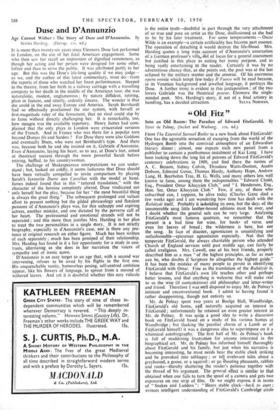Duse and D'Annunzio
Age Cannot Wither : The Story of Duse and D'Annunzio. By Bertita Harding. (Harrah. 12s. 6d.) IT is more than twenty-six years since Eleonora Duse last performed in London, on the eve of her fatal American engagement. Some who then saw her recall an impression of dignified remoteness, as though her acting and her person were designed for some other, loftier end than to serve the public. It was attributed partly to her age. But this was the Duse's life-long quality if we may judge— as we, and the author of this latest commentary, must do—from the reports of those who watched her finest performances. Steeped in the theatre, from her birth in a railway carriage with a travelling company to her death in the middle of the American tour, she was naturalistic, modest, unglamorous ; by nature diffident, retiring, plain in feature, and utterly, ardently sincere. The wonder is that she could in the end sway Europe and America. Sarah Bernhardt had so effectually proclaimed the star system, with herself as first-magnitude ruler of the firmament, that no rival could slip by to fame without directly challenging her. It is remarkable, too, how meagre was the available repertory. Henry James had com- plained that the only plays in London were eviscerated versions of the French. And in France who was there for a popular turn beyond Dumas Eels and Sardou ? For Duse there were also Goldoni and eventually Ibsen, who were not Bernhardt's type. And there was, because both he and she insisted on it, Gabriele d'Annunzio. Even d'Annunzio, laying his heart, so to say, at Duse's feet, aimed at theatrical success through the more powerful Sarah before retiring, baffled, to his countrywoman.
The challenge of Shakespearean interpretations we can under- stand ; but, looked on coldly, it seems ludicrous that Duse should have been virtually compelled to invite comparison by playing Sarah's favourite Dame aux Camelias with the model at hand. James indeed found that in this " tattered translation," with the character of the heroine completely altered, Duse vindicated not only herself but the play, because for her " the most beautiful thing is always the great thing." The subsequent prolonged and valiant effort to present nothing but the gilded phraseology and flatulent passions of d'Annunzio's plays was, for this unhappy and aspiring actress, another mistake, and one dictated by the perverse call of her heart. The professional and emotional strands will not be separated ; and this more than justifies Mrs. Harding in her plan to treat the two personalities in a single story. It is not strictly biography, especially in d'Annunzio's case, nor is there any pre- tence at original research on either figure. Much has been written of each separately ; much has been gossiped of their relationship. Mrs. Harding has found in it a fair opportunity for a study in con- trasts, alternating as she does in her narration the voices of sympathy and of ironic scorn. D'Annunzio is an easy target to an age that, with a second war intervening, refuses to be awed by his flights in the first one. His unquenchable vanity, humourless posing, self-centred ambition appear, like his flowers of language, to sprout from a mound of withered leaves. And yet it is doubtful whether this easy ridicule is the entire truth—doubtful in part through the very attachment of so true and pure an artist as the Duse, disillusioned as she had to be by his later treatment. For some temperaments — Oscar Wilde is an example—a certain artificiality has become part essence. The operation of detaching it would destroy the life-blood. Mrs. Harding quotes a long irate. account of d'Annunzio's annexation of a German professor's villa,Af of focus for a general assessment but justified in this place as suiting her ironic purpose, and as being vastly entertaining to the reader. Certainly it was by no adventitious chance that, as she points out, the poet was at the last eclipsed by the military stunter and the amorist. Of his enormous opera omnia which tempt few today 11 Fuoco will be read because, in its Venetian background and jewelled language, it portrays the Duse. A further irony is evident in this juxtaposition ; of the two lovers Gabriele was the theatrical poseur, Eleonora the single- minded poet. Mrs. Harding's story, if not of a final artistry in handling, has a decided attraction. SYLVA NORMAN.


































 Previous page
Previous page